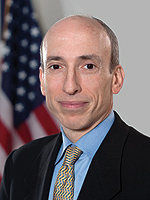Message from the Chairman
 Since the passage of the Commodity Exchange Act (CEA), the Commodity Futures Trading Commission (CFTC) and its predecessor agencies have been responsible for ensuring the fair, open, and efficient functioning of futures markets—we have met that challenge. After the 2008 financial crisis, and the subsequent enactment of the 2010 Dodd-Frank Wall Street Reform and Consumer Protection Act (Dodd-Frank Act), the CFTC‘s mission was expanded to include, for the first time, oversight of the swaps marketplace. The Commission still has much work to do to complete effective implementation of the Dodd-Frank Act and police the over-the-counter (OTC) markets. Once implemented, derivatives dealers will be subject to robust oversight. Standardized derivatives will be required to trade on open platforms and be submitted for clearing to central counterparties, all of which will be subject to Federal regulation and supervision.
Since the passage of the Commodity Exchange Act (CEA), the Commodity Futures Trading Commission (CFTC) and its predecessor agencies have been responsible for ensuring the fair, open, and efficient functioning of futures markets—we have met that challenge. After the 2008 financial crisis, and the subsequent enactment of the 2010 Dodd-Frank Wall Street Reform and Consumer Protection Act (Dodd-Frank Act), the CFTC‘s mission was expanded to include, for the first time, oversight of the swaps marketplace. The Commission still has much work to do to complete effective implementation of the Dodd-Frank Act and police the over-the-counter (OTC) markets. Once implemented, derivatives dealers will be subject to robust oversight. Standardized derivatives will be required to trade on open platforms and be submitted for clearing to central counterparties, all of which will be subject to Federal regulation and supervision.
Staff will be required to oversee swap dealers, the clearing of swaps and the trading of swaps on exchanges, or swap execution facilities (SEFs). These new responsibilities are in addition to the Commission‘s existing mission of policing the futures marketplace. Some of the CFTC’s new authorities will be consistent with our current authorities but expanded to also include swaps. Some will be new responsibilities, such as regulating swap dealers, major swap participants, SEFs, and swap data repositories (SDRs).
The CFTC can meet the challenge of its expanded mission to ensure the fair, open, and efficient functioning of the swaps markets. The Commission has one year or less to write the required rules to help strengthen market integrity, transparency, and competition; we are just past halfway through that process. The U.S. futures marketplace that has long been regulated by the CFTC currently has a notional value of approximately $40 trillion. The U.S. OTC derivatives marketplace has a notional value of approximately $300 trillion, or nearly eight times the notional amount of the futures markets.
We submit our Strategic Plan for fiscal years 2011 through 2015 keenly aware of the significant near and long-term challenges we face. A broader and more complex mission requires building capacity in skilled staff and advanced technology solutions to oversee the highly sophisticated electronic marketplace. Growth and change require an organizational structure aligned to successfully integrate and carry out existing and developing authorities. Effectively optimizing, integrating, and structuring Commission resources demand a more robust operating model capable of supporting a larger Commission in its direction setting and decision-making.
In the near term, the Commission is focused on writing rules to regulate the OTC derivatives marketplace. Over the long term, we must invest resources to effectively implement and enforce the new regulations. Resources are essential for this to be accomplished. We will continue to automate our surveillance of the markets and bolster our enforcement program to maximize the capability of limited resources and to more efficiently police for fraud, manipulation, and other abuses. We will strengthen our oversight divisions and continue working with international regulators to harmonize our rules in the global markets. The challenges before the Commission are significant, but can be met, provided we are sufficiently resourced. I am confident that our talented and hard-working staff will do all they can to meet the goals and objectives set out in this Strategic Plan.
![]()
Gary Gensler
February 28, 2011



